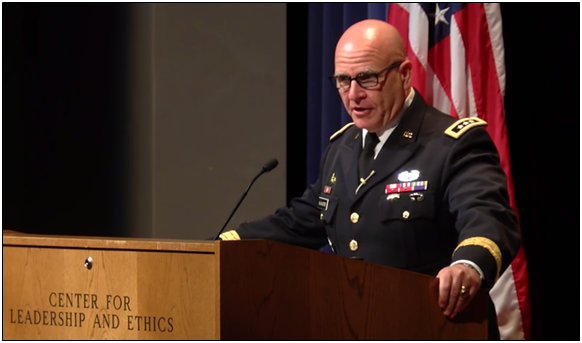By Natalia Castro
Lt. General H.R. McMaster has been a military man for his entire life, as a fighter and as a scholar he has praised, critiqued and led military advancements for the last 30 years. As the first active duty military officer to take the post since the Reagan Administration, McMaster’s deep military history provides insight and clues as to how he will execute the next four years of President Donald Trump’s foreign policy.
As an officer in 1991, McMaster fought in the Gulf War and earned his first military decorations, but his first motion on the political stage was in his 1997 dissertation-turned-book, Dereliction of Duty. McMaster outlined what he viewed as critical errors leading to and during the Vietnam War — rejects the influence of politicians into certain war-time decisions.
McMaster wrote critically of the Lindon Johnson administration’s micromanagement of the war without adequate intelligence and stressed the necessity for a strong relationship between the military and the administration. He wrote in his book, “The relationship between the president, the secretary of defense, and the Joint Chiefs led to the curious situation in which the nation went to war without the benefit of effective military advice.”
This healthy skepticism McMaster brings into his philosophy has been evident throughout his career, often organizing thorough and careful military advancements. When McMaster entered into Iraq to once again to fulfill presidential orders in 2005, he proved his ability to apply his military mind — and help change course when necessary.
Foreign Policy writer Thomas Ricks called McMaster the “first commander to get things right in Iraq” siting his recapture of several Iraqi cities. Ricks explained, “He had the 3rd ACR bolster the security operation along the Syrian border, in an effort to cut off support and reinforcements from coming in. He then eliminated safe havens out in the desert, beginning in June with a move against the remote town of Biaj, which had become a way station and training and outfitting post for those fighters coming in from Syria. Immediately after the 3rd ACR took Biaj, Iraqi forces set up a small patrol base there. When U.S. military experts conducted an internal review of the three dozen major U.S. brigades, battalions, and similar units operating in Iraq in 2005, they concluded that of all those units the 3rd ACR had done the best at counterinsurgency.”
McMaster’s military skill has made him director of the Army Capabilities Integration Center, where he worked on designing the Army of 2025 and beyond. Within this job he maintained focus on ways to counter weapons and tactics that Russia used on Ukraine, citing the incident as a rising threat to global stability.
While he has spent years preparing the military into the future, now he must guide current foreign policy.
NPR of Feb. 2017 predicts McMasters first global issue will not be an unfamiliar one, as he they write, “McMaster’s most immediate challenge will be helping to coordinate the effort to drive the Islamic State out of its last stronghold in Iraq, the western side of Mosul.”
With the Islamic State’s growing influence over the region, McMaster will have to utilize his careful skepticism to arrange a plan the people, the military, and the president can agree on.
McMaster has earned the endorsement of General David H. Petraeus for the “clear, hold, and build” strategy McMaster devised in Tal Afar and Petraeus implemented to stabilize Iraq in 2007.
For Trump, who has not served in the military, McMaster offers a silent yet strong approach and perspective, giving him additional perspective on military matters.
And as issues in Iran, North Korea, Ukraine, Iraq and Syria remain volatile, McMaster’s caution could provide a needed perspective after decades of foreign interventionism that sometimes resulted in catastrophe. After all, not every problem will necessarily have a military solution.
With a healthy, suspicious view then of the political relationship between the military and administrations and the use of force, McMaster may wind up serving as a much-needed bridge between the two in executing Trump’s foreign policy agenda.
Natalia Castro is a contributing editor at Americans for Limited Government.







